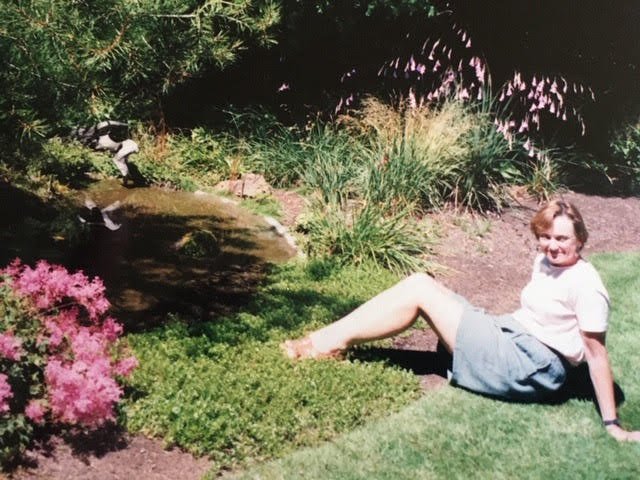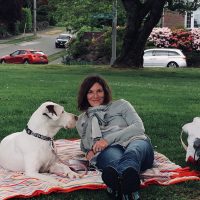“In South Africa, everybody gardens,” she says.
“The natural flora is abundant, and diversity of species immense.” Jeanette’s words easily find their way to me over a plate of sweetly powdered lemon bars, red grapes, and red rooibos pumpkin tea. I’ve been graciously invited into the living room of her post-war rambler home, decorated with understated wood furniture, and adorned with oriental textiles and artwork from her hometown of Johannesburg. Unobstructed floor-to-ceiling windows frame the home, turning her half-acre garden into a living illustration of the story that is to come.
Though she has resided in the Pacific Northwest for over 50 years, Jeanette gravitates toward southern hemispheric plants because they feel like home to her—a strong foundation of her identity. She calls the penchant her “love affair” with plants— especially those from her hometown.
I think of what draws us into certain relationships. Maybe we tend to resonate with others whom we feel are like “home” to us, people with whom there is a shared sense of meaning and understanding of life, or maybe, simply, who remind us of where we come from.
A plant’s diversity interests Jeanette, and she researches their native habitat in order to duplicate that environment in her Pacific Northwest home garden. Peonies from Eastern Washington require sand, dirt, and a dry climate. She mimics this topography in a portion of her garden that is protected from frequent rain and moisture, and it is here that her peonies grow and thrive, despite being so far from their native land.
Do I create this type of space for my partners and friends—spaces in which I support their growth? How can I provide what they need to feel seen and heard?
It is in the tiny moments of active listening without filtering in my agenda, my need to control, or my own fear and expectations, that I see the person right in front of me, unconditionally. Jeanette gives to her plants whatever they need to thrive, all without fear of loss or anything else. When will I be able to let go of my fear and give to my friends, lovers, and children, unconditionally?
My brave new friend immigrated to Canada at 21 years old, then to the United States at 25. Since then, she has been immigrating some of her native land plants to her home garden. Interestingly, in order to adapt to its new habitat in the Puget Sound, the Ouhout or “old wood” tree indigenous to the Gauteng region of South Africa, changed in structure when relocated. Here in the Pacific Northwest, she tells me as she points toward her garden through the window, it has become more of a large rambling shrub, less a tree.
Like the sprawling Ouhout, she too had to adapt to her changing landscape in order to thrive, which made her tougher and more constrained—more impenetrable than she would have been staying close to her family in Johannesburg. She wonders if marrying young forced her to grow up faster than she was prepared—if it took the playfulness and indulgence out of life.
I take in her expression as she lingers on this last thought, and I wonder if Jeanette gives to her plants what she, herself, has been missing all these years. I wonder about all the ways that I, too, have adapted to the changing terrain in my life, and the relationships that have been planted in my garden.
From these changes and relationships, I have grown certain traits such as responsibility, accountability, self-discipline, and patience. I’ve pruned away others such as immaturity, shortsightedness, and selfishness. But that is only when my environment has been loving, attentive, and nurturing enough, as Jeanette has been with her plants. There have been plenty of times when my environment, myself, or my partner, was not healthy enough to provide adequate nurturing. And it was in the times when I became too sick and depleted—in a constant state of survival mode—that my potential for growth and evolution was stunted.
Time has become precious for my friend, the gardening sage, as she settles into her mid-70s (though she looks 15 years younger). She has become more deliberate when it comes to cutting things back, or down, or out of her garden. She is as steadfast in removing the deadness and clutter from her garden as she is of her life—relationships that hurt, clothes that go unworn, habits proven counter-productive.
What have I pruned from my life? What relationships, habits, beliefs, or behaviors remain that block the blossoming of new growth and actualization?
Jeanette tells me she was heartbroken over having recently cut down a tree nearly her age. The Atlas Cedar is a native to the Atlas Mountains of Morocco and has lived in her backyard since she inhabited it back in 1972. When I asked her why she had to cut down the thriving tree, she remarked, “It was too healthy. It was given too much of everything good.” She over-nurtured and overindulged it, and it became too big, too fast. Its aggressiveness and dominance were so overpowering that it prevented the adjacent Sequoia from growing its own branches on the cedar-facing side. Thus, creating imbalance in the Sequoia.
How often have I overindulged a relationship, a person, or myself only to become so aggressive and dominant as to thwart the growth or path of someone else, or myself? I think of my three boys and how my anxiety has swirled around this relationship dynamic at dizzying speeds. Who am I not providing for? Who I am giving more to? How can I make up for not being there as a part-time mother, or aunt-turned-mom? How often have I rushed my kids, or partner, or job, only to lose sight of where things are, in focusing on where I want them to be?
She reflects back to the Sequoia’s stunted growth as a result of the aggressive cedar and wishes she had done more research on it; wishes she had had more resources, perhaps. But in the end, she worked with the knowledge and skills she had at the time. Her life, like her garden, has evolved in a less than methodical way, more a wandering through uncharted lands. Although she wonders what her life would have been like had she stayed in Johannesburg and pursued her psychology degree, the exercise proves futile for her because of the richness she found in being a mother to her three sons.
The portion of the menacing cedar has redeemed itself, however. “Saved by one little bird,” Jeanette remarks with relief. She has chosen for the tree to stay put and be used as snag for the wildlife of her garden and the neighborhood. When a tree dies in the woods and loses its top, it becomes a haven for woodpeckers and birds in which to build habitat.
Like the cedar, we are all redemptive and embody generous qualities, especially when enwrapped in a compassionate and forgiving relationship. No doubt, I have messed up as a mother, lover, friend, daughter, sister, and therapist. No doubt, I have provided more shade and less sun, more pressure and less spaciousness; and I believe that I, you, and we, deserve forgiveness over, and over, and over again.
Gardens, like relationships, have seasons. Spring, as she says, is the season she works hardest for. The time when “we come out of the darkness and celebrate the return of the light.”
We are the constant gardener of our relationship’s seasons. Times when we work hard to cultivate and nurture our loved ones with trust, understanding, and patience; and times when we bask in the radiating sun and bloom of devotional love. All the while knowing with wisdom that everything changes, and a garden, like our relationships, is impermanent; we expand and contract to its ever-changing needs.
I have observed over the years as a mother, that I am most carefree and relaxed and open with my kids when I am on vacation and away from our daily chaos. I see them without the stressful veils that blur my vision, Monday through Friday. When I let go of “daily” life, my cup is full and ready to be shared, and I am quicker to engage in playful enticements. But, as my wise gardening friend says, “It can’t always be spring.”
Jeanette likes the “structure” of a winter garden. It’s quiet and orderly and “all the bones remain.” She takes pride in growing plants and trees with bones, like the broad-leaved and coniferous trees. She wants her garden to have an enduring quality, a substance, and not just the “showy” vibrancy often admired in perennials.
I have often been drawn to the aesthetics of people and things—the instant gratification and pleasure received from beautifully vibrant and appealing stimulation—yet I’ve often been left unsatiated in my soul.
My friend’s need for structure may be borne out of being an immigrant from South Africa, and lack of a cohesive family structure in the United States. Her garden has always been an escape, a way to be with the earth, connect with life, and be able to make things grow again. Like a mother, she has a running checklist in her head of all the plants and their needs, and what needs attending to at any given moment.
Sitting with this gracious woman who has come to remind me of my mother, who died three years ago this winter, I begin to realize that this time spent is less about getting the “answers” to my questions. Being in the presence of someone who is an expert, who is skilled, who is devoted, I begin to realize, it is less the words she says, and more her embodiment of passion, love, and dedication for her craft that I am meant to receive. She is her garden. Her garden is the footprint of her life, and generations past and future, tended to and cared for, from her heart and soul to her hands.









Read 8 comments and reply